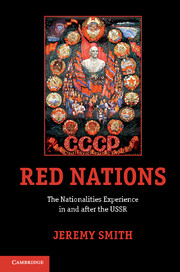Book contents
- Frontmatter
- Dedication
- Contents
- Tables
- Preface
- 1 Introduction: the prison-house of nations
- 2 Dispersal and reunion: revolution and civil war in the borderlands
- 3 Bolshevik nationality policies and the formation of the USSR: the Bolsheviks dispute national policy
- 4 Nation-building the Soviet way
- 5 Surviving the Stalinist onslaught, 1928–1941
- 6 The Great Patriotic War and after
- 7 Deportations
- 8 Territorial expansion and the Baltic exception
- 9 Destalinisation and the revival of the republics
- 10 Stability and national development: the Brezhnev years, 1964–1982
- 11 From reform to dissolution, 1982–1991
- 12 Nation-making in the post-Soviet states
- 13 The orphans of the Soviet Union: Chechnya, Nagorno Karabakh, Abkhazia, South Ossetia and Transdniester
- Conclusion
- Bibliography
- Index
- References
5 - Surviving the Stalinist onslaught, 1928–1941
Published online by Cambridge University Press: 05 June 2014
- Frontmatter
- Dedication
- Contents
- Tables
- Preface
- 1 Introduction: the prison-house of nations
- 2 Dispersal and reunion: revolution and civil war in the borderlands
- 3 Bolshevik nationality policies and the formation of the USSR: the Bolsheviks dispute national policy
- 4 Nation-building the Soviet way
- 5 Surviving the Stalinist onslaught, 1928–1941
- 6 The Great Patriotic War and after
- 7 Deportations
- 8 Territorial expansion and the Baltic exception
- 9 Destalinisation and the revival of the republics
- 10 Stability and national development: the Brezhnev years, 1964–1982
- 11 From reform to dissolution, 1982–1991
- 12 Nation-making in the post-Soviet states
- 13 The orphans of the Soviet Union: Chechnya, Nagorno Karabakh, Abkhazia, South Ossetia and Transdniester
- Conclusion
- Bibliography
- Index
- References
Summary
Two decrees of the CPSU Politburo in December 1932 marked a significant shift in the policies of nation-building and korenizatsiia. The first concerned the grain collections crisis in Ukraine and the North Caucasus, and blamed the policies of ukrainisation for disguising the activities of ‘kulaks, former officers, Petliurites and supporters of the Kuban Rada’ to sabotage the collections;
instead of a correct Bolshevik implementation of the nationalities policy, in many Ukrainian regions Ukrainization was carried out mechanically, without considering the specifics of each district, without a careful choice of Bolshevik Ukrainian cadres. This made it easy for bourgeois-nationalist elements, Petliurites and others to create a legal cover for their counterrevolutionary cells and organizations.
A second decree formally brought an end to the policy of ukrainisation. In reality, these decrees, which were issued in the context of agricultural difficulties, reflected a change in direction that had already been evident for four years. By the end of 1932, most of the prominent national communists of the 1920s had been removed and many of them arrested. An assault against the Pokrovsky school of history and national historians was already underway. The implementation of collectivisation had uprooted the cultural basis of peasant life for Russians and non-Russians alike. Kazakh nomads had suffered especial horrors, and the Ukrainian countryside was about to plunge into the worst famine in its history.
- Type
- Chapter
- Information
- Red NationsThe Nationalities Experience in and after the USSR, pp. 97 - 121Publisher: Cambridge University PressPrint publication year: 2013



